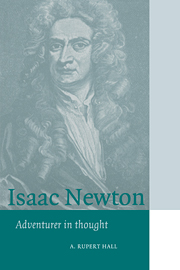Book contents
- Frontmatter
- Contents
- List of Figures
- General Editor's Preface
- Foreword
- Acknowledgement
- 1 The Hopeful Youth, 1642–1664
- 2 “The prime of my age for invention”, 1664–1667
- 3 Widening Horizons, 1667–1669
- 4 The Professor of Mathematics, 1669–1673
- 5 Publication and Polemic, 1672–1678
- 6 Life in Cambridge, 1675–1685
- 7 The Chemical Philosopher, 1669–1695
- 8 The Mathematical Principles of Natural Philosophy, 1679–1687
- 9 Private and Public life, 1685–1696
- 10 Fluxions and Fury, 1677–1712
- 11 Opticks, or a Treatise of Light, 1687–1704
- 12 Life in London, 1696–1718
- 13 A Man of Authority and Learning, 1692–1727
- 14 Later Books, 1706–1726
- 15 Kensington, 1725–1727
- Appendices
- Notes
- Bibliography
- Index
1 - The Hopeful Youth, 1642–1664
Published online by Cambridge University Press: 12 January 2010
- Frontmatter
- Contents
- List of Figures
- General Editor's Preface
- Foreword
- Acknowledgement
- 1 The Hopeful Youth, 1642–1664
- 2 “The prime of my age for invention”, 1664–1667
- 3 Widening Horizons, 1667–1669
- 4 The Professor of Mathematics, 1669–1673
- 5 Publication and Polemic, 1672–1678
- 6 Life in Cambridge, 1675–1685
- 7 The Chemical Philosopher, 1669–1695
- 8 The Mathematical Principles of Natural Philosophy, 1679–1687
- 9 Private and Public life, 1685–1696
- 10 Fluxions and Fury, 1677–1712
- 11 Opticks, or a Treatise of Light, 1687–1704
- 12 Life in London, 1696–1718
- 13 A Man of Authority and Learning, 1692–1727
- 14 Later Books, 1706–1726
- 15 Kensington, 1725–1727
- Appendices
- Notes
- Bibliography
- Index
Summary
Early Childhood
The Newton family belonged to the yeoman class descended from the most modest of the free landholders of manorial England. Socially beneath the esquires and knights, some members of this class had prospered greatly after the fourteenth-century decline of feudalism. Later the dissolution of the monasteries, sheep-farming and inflation had given some yeoman families, like the Newtons, means to enter the gentry class. As small landowners they lived in solid houses of brick or stone, sometimes adjacent to the barns and farmyard, like Newton's birthplace at Woolsthorpe in Lincolnshire. Yeomen, who could not prosper by idleness, constituted a great reservoir of ambition and talent, supplying Church, universities and the law, as well as commerce and industry. They wrote plays for the stage and music for the nobility; they staffed the empire. The father whom Isaac Newton never knew, also Isaac, could not sign his name but his mother and half-sisters were literate after the phonetic style also practised by the greatest ladies. When the posthumous child was three years old his mother, Hannah, remarried Barnabas Smith, rector of nearby North Witham. Smith owned a small library of theological books, works of the Fathers and so on, which passed to his stepson. Thus Isaac was born into the lower limit of landed property and learning alike. When he was old and famous he took pains to satisfy the College of Heralds of his common descent with an established armigerous gentleman, Sir John Newton, who was glad to bring so famous a man among his own kin. Sir Isaac Newton for his part responded to many begging letters from his poor relations.
- Type
- Chapter
- Information
- Isaac NewtonAdventurer in Thought, pp. 1 - 29Publisher: Cambridge University PressPrint publication year: 1996



